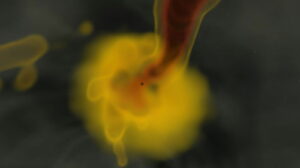
A groundbreaking blood test developed by researchers at the University of Chicago has demonstrated the ability to detect early-stage colon cancer with an impressive 95% accuracy. This innovative test, which analyzes RNA modifications, represents a significant advancement in the field of cancer diagnostics.
The announcement comes as liquid biopsies continue to revolutionize cancer detection. These non-invasive tests rely on a simple blood draw to search for genetic markers of cancer, offering a less painful alternative to traditional biopsies that require tissue removal through surgery or needles. However, existing liquid biopsies often fall short in detecting early-stage cancers, as small tumors do not release sufficient DNA into the bloodstream for detection.
Revolutionizing Early Cancer Detection
Researchers at the University of Chicago have tackled this challenge by shifting their focus from DNA to RNA. Unlike DNA, which provides a static genetic blueprint, RNA acts as a real-time messenger, reflecting cellular activity. This dynamic nature of RNA allows for the detection of cancerous activity even when DNA levels are too low to be detected.
Dr. Chuan He, a senior author of the study and a Professor of Chemistry, Biochemistry, and Molecular Biology at the University of Chicago, explained, “That has been a major challenge for early diagnosis. You just don’t have enough tumor DNA released into the blood, so we decided to look at RNA instead.”
“This is the first time RNA modifications have been used as a potential biomarker for cancer,” said Dr. He. “Being able to detect the cancer at those early stages is unprecedented.”
The Science Behind RNA Modifications
The research team, including graduate student Cheng-Wei Ju and Dr. Li-Sheng Zhang, developed a method called low-input multiple methylation sequencing, or LIME-seq. This technique maps and measures chemical modifications on RNA fragments in blood, providing a stable marker for cancer detection.
Importantly, the percentage of RNA that carries these modifications remains consistent, even as RNA levels fluctuate. This stability makes RNA modifications an ideal marker for cancer, as demonstrated in the study published in Nature Biotechnology.
Insights from Microbial RNA
In a surprising twist, the researchers discovered that RNA fragments from gut microbes also play a crucial role in cancer detection. Billions of bacteria inhabit the digestive system, and their behavior changes in response to cancer growth.
“We found that RNA released from microbes has substantial differences between cancer patients versus healthy individuals,” Dr. He noted. “In the gut, when you have a tumor growing, the nearby microbiome must be reshaped in response to that inflammation.”
LIME-seq detects RNA modification signatures in microbiome-derived RNAs in plasma cfRNA, offering a set of biomarkers for CRC early diagnosis.
The team profiled blood samples from 27 cancer patients and 36 healthy individuals, discovering that microbial RNA provided distinct patterns that could differentiate cancer patients from healthy controls. This approach achieved 56% sensitivity and 97% specificity for detecting colorectal cancer, suggesting a promising new avenue for early detection.
Implications and Future Directions
This development follows a growing trend of utilizing RNA modifications as biomarkers for various diseases. The potential to detect cancer through a simple blood test could transform the landscape of cancer diagnostics, offering a faster, less invasive, and more accurate method for early detection.
The study was supported by several prestigious institutions, including the Ludwig Center for Metastasis at the University of Chicago and the National Institutes of Health. As the research progresses, the team plans to conduct larger clinical trials to validate their findings and explore the potential application of their method to other types of cancer.
Dr. He and his colleagues are optimistic that within a few years, RNA modification tests could become a standard part of routine health checkups, significantly improving early cancer detection and patient outcomes. Furthermore, this research may pave the way for new insights into the role of the microbiome in cancer development, potentially leading to novel prevention strategies.
“It’s like listening to whispers instead of waiting for a shout,” said Dr. He. “We’re looking for small signs of cancer long before it becomes dangerous.”
As scientists continue to explore the intricate relationship between microbial RNA and cancer, the hope is that one day, manipulating the gut microbiome could serve as a preventative measure against cancer, marking a new frontier in medical science.





